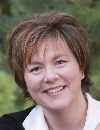 Bonnie Grove developed and wrote social programs for families at risk before landing her first publishing deal for Working Your Best You: Discovering and Developing the Strengths God Gave You (March 1, 2009,Beacon Hill Press). Her debut novel is Talking to the Dead (Summer, 2009, David. C. Cook). Grove and her pastor husband, Steve, have two children; they live in Saskatchewan. |
Writer, Eh? |
|
Let’s get it out on the table straight off: I’m Canadian. There. I said it. Now I’ll sit back and give the American’s time to nod thoughtfully, smile, and say, “That’s okay,” and “Oh, I’ve been to Montreal! Do you know Bob? Bob from Montreal?” Probably not. If you ask an American, any American, what they think of Canada and Canadians, they smile and say “Lovely country. Nice people. Cold up there, isn’t it?” We have a good relationship, Canada and the U.S. We’re friends, we get along, we know the same people, we invite each other to parties. But when it comes to being a Canadian writer, when we go to those same parties as our U.S. friends, we have to rely on them to get us a date. Canadian writers are sort of like your big awkward cousin—he’s wonderful, a real charmer, but the girls just don’t go for him. Which is weird. I mean, we’re so much the same as Americans—we wear the same clothes, go to the same movies, drink the same expensive coffee, and write about the same subjects. Right? Right. Sorta. Up here in the cool, Canadian air, we’ve been pondering what it is to be Canadian for a long time. The minute we figure it out, we’ll let you know. But here’s one defining factor about being a Christian Canadian writer—limited opportunities. Don’t get me wrong, there’s no limit of talented, even gifted, Canadian writers who are Christian. There are swhacks of us. All writing our heads off, getting published in all sorts of newspapers, periodicals, magazines, anthologies, books of every genre. The Canadian literary world is vibrant, alive, diverse, and exciting. But not terribly famous. When was the last time you heard an American author, editor, or agent say, “Sorry, I’ve got to run! I must get up to Canada and see what all the fuss is about!” That brings us to the limited opportunities part. There simply aren’t many Canadian publishers who specialize in the Christian market. And of those who do, none of them can make any money publishing Christian fiction. Why? Math, that’s why. According to The World Fact Book, as of July ’08, Canada has a population of 33,212,696. The U.S.? 303,824,640. Yowza! So how do Canadian writers who are Christian get their work published and read widely? We acquire U.S. agents and U.S. publishers (that’s what I did). And our books get sold in U.S. stores. It’s all good, right? Yes. It is. It’s very good. It is precisely because of how similar Canadians are to Americans that we can write and be published and sold in the U.S. |
But before I call for a group hug and we all link arms to sing “He’s Got the Whole World in His Hands,” I need to point something out. Remember when, speaking of the similarities between Canadians and Americans, I said, “We wear the same clothes, go to the same movies, drink the same expensive coffee, and write about the same subjects”? The “write about the same subjects” is where we run into an obstacle. For the most part, Canadians don’t write about the same subjects as Americans. The Canadian-written novels that end up in the hands of U.S. agents, editors, publishers, and readers are usually the most “Americanized” books produced by our shivering Canadian hands. Including mine. That’s not a bad thing, it’s just a fact. But what about the Canadian writer who pens heartbreaking novels about the events of 1776 in Canada? (Did you know Canadians at that time viewed Benjamin Franklin as “intolerant”?) Or a novel about a young girl who’s life is torn apart during The Grand Dérangement (The Great Upheaval of the 1700s, when Acadians were forcibly settled throughout North America), or the cloak and dagger story of international meddling that is the Avro Canada CF-105 Arrow? These soundly Canadian stories can’t find a toehold in the American market. Not because the U.S. is filled with literary bullies who say, “Our way or the highway!” Far from it. But markets dictate what books publishers acquire (Oh, let’s all take a deep breath to recover from that shock), and the U.S. market is huge. The sparsely populated Canadian landscape is no match for the bustling, bursting cities of the U.S. Our stories are as stunning, heartbreaking, outrageous, and bedazzling as our American counterparts, but we lack the numbers to be considered truly glamorous. I mean, if Canada is so great, how come so few people live there? So why don’t we get our own publishing houses and produce our own books? We do. And they sell well—in Canada. But with a smaller population comes smaller sales. Smaller sales mean fewer dollars. Fewer dollars means eating becomes a rare event for full-time writers. All this tail chasing suggests a couple of things for Christian Canadian writers. Either go the route of selling to the U.S. market, or stay home and plow the rock-riddled fields of Canadian publishing. Some of us try to do both. There is no “good, better, best” in this scenario. For the Canadian writer it is an endless game of eeny, meeny, miny, moe, catch a paycheque by the toe. So the next time you have a chance, hug a Canadian. Better yet, read one. |







